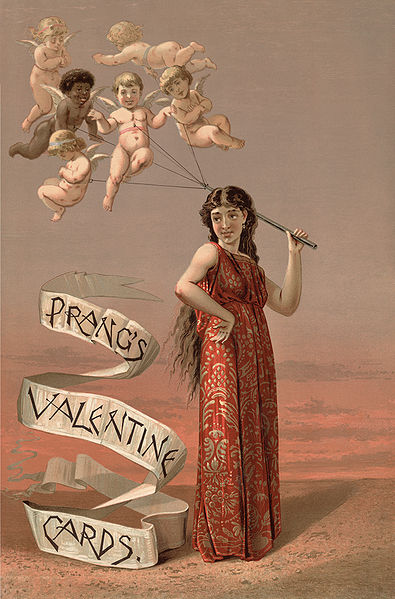Celebrating Love: Fun Alternatives to Valentine's Day

Ahh, Valentine's Day. Spring is just around the corner, and love is in the air. And what better way to while away that last bit of warm-weather anticipation as we slosh through the last half-melted snows of winter, than with a sudden outpouring of love and cozy devotion? ...but eh, what's that? Boxed chocolates and cherubs-on-a-string aren't your thing? Never fear! As it turns out, mid-February offers quite a number of observances of all sorts of love-- and not just the Hallmark variety.
Saintly Devotion: the Origins of Valentine's Day
Many of us in grew up believing that a real saint was attached to this cordial holiday, and that much is only partially true. For what is little known is that no less than three Saint Valentines were once celebrated with this Catholic holy day, until the Feast Day was removed from the official Roman Catholic Saint's Calendar in 1969. The original Valentine saint(s) had no connection to romantic love, however, until the 14th century when popular myth surrounding a fictional Saint Valentine began to circulate. This Saint Valentine was captured by Emperor Claudius II, who tried in vain to convert the early Christian to pagainism; the Saint refused, and by turns tried to convert the Emperor to Christianity. The Saint was executed, of course, but not before performing the miracle of restoring vision to his executioner's blind daughter. Later versions of this tale added romantic intrigue, suggesting the Saint also sent a love-letter to the girl, signed "Your Valentine", and the reason for execution embellished by the Saint's secret occupation of marrying sweethearts to their young service men, who were legally bound to staying single.
Geoffrey Chaucer may be credited with forever binding Saint Valentine's day to romantic love in the 14th century. In a poem honoring the engagement of Richard II to Anne of Bohemia, The Parlement of Foules, Chaucer wrote, "For this was Saint Valentine's Day, when every bird cometh there to choose his mate." In earlier centuries, February 11 was celebrated in England as The Day the Birds Began to Sing, coinciding with a Feast Day for Saint Radegund, who escaped her abusive husband by hiding in a field of magically-grown barley. The following February 14 was the day birds then chose their mates, as "courtship flights" of crows in particular were easily witnessed by the populace. And in Shakespeare's day, a folk tradition allowed that the first person one would meet on Valentine's Day would be one's true love-- though alas, this did not work out so well for Hamlet's poor Ophelia.
As it turns out, we have a far more domestically sober source than romantic poets to thank for our current Valentine madness: the General Post Office of the British Empire. A reduction in postal rates allowed Victorian Valentines to exchange sometimes-racy verses via post, and anonymously at that, for the first time. Such mechanical Valentines (such as the one pictured above) and factory-manufactured paper Valentines became enormously popular, and they remain the most oft-chosen methods of delivering messages of love both in England and America. This billion-dollar industry found its footing in the 1840's, and in America as in England, mass-produced Valentines found their debut. Presently, Valentine's Day is second only to Christmas in terms of volumes of greeting cards sent through the mail.
The Fertile Month of February: Roman Festivals
So as go the birds, there also go humans, but how could such a day sacred for choosing mates attach itself to the feast day of (one of 3 possible) Catholic martyrs? Perhaps a clue lies in another group of seasonal celebrations, which certainly would have influenced the upper-crust of England: the Roman cycle of Parentalia, Lupercalia, Feralia, and Caristia.
Long before the feast day of Saint Valentine, there was a long string of Roman celebrations for ancestry, fertility and family. Parentalia was an 8-day festival that began on the 13th of February. Civic functions ceased and people visited the graves of their ancestors, bearing offerings of libations and, in some cases, the blood of black animals. Offerings were again given on the 21st for Feralia, along with elaborate rituals ensuring against harmful gossip, officially marking the end of the solemn week of rites for deceased parents and ancestors. Caristia followed on the 22nd, which was a day of celebratory family reunions. Ovid wrote of the bittersweet quality of these days, "Sweet, too, after so many departed, to look upon those of our blood who are left, and to count kin with them."
Yet one of best known of all Roman holidays, and one of the most important to Rome in particular, is Lupercalia. A wild festival honoring fertility, and connected to the she-wolf that suckled Remus and Romulus (the founders of Rome), Romans celebrated with a particular blend of sacrifices and ritual "flogging" of women with goatskin thongs called februa, to give luck with conception. In the midst of the sacrifices and whipping, rites included a fit of ritual laughter.
A more domestic holiday also found its way into the February celebrations. Fornacalia was the ritual cleansing of bread-ovens and of the baking of bread; a movable feast, it could take place anywhere between the 5th and 21st of Februalia, which as the last month of the Roman calendar was known as the "days of purification".
Perhaps it is a stretch, but in a month that was known in ancient Athens as Gamelion (dedicated to honoring the marriage of Zeus and Hera), and culminating in the general Roman fest of Juno Februa (chaste Juno) on the 14th, it seems February 14 has long been associated with the charms of honoring ancestry, fertility, and love.
Forget the chocolates and roses; how will you celebrate Valentine's Day this year?
Fun Alternatives to the Common Valentine
- Honor the "marriage of birds" as Sarah Ban Breathnach does, feeding them with special peanut--butter-and-birdseed treats, and decorating the trees near your home to welcome their honeymoon.
- Practice Eower Midde-Engle (your Anglo-Saxon, that is) and read Chaucer's The Parlement of Foules in its original form.
- Apply sweet old English folk customs to find your true love: pin 5 bay leaves to your pillow on Valentine's eve, and dream of your mate; write the names of your loves on small slips of paper, wad these each in their own ball of clay, and drop the clay-balls in water-- the first to surface will bear the name of your truest love; or put the paper strips in a container and draw one, which will bear the name of your new love.
- Similarly, draw "lots" as the ancient Romans did, to learn the identity of your lover on Lupercalia or the feast of Juno Februa.
- Not in the mood for love? Why not gather friends around your living room for a hearty bout of Ritual Laughter?
- Celebrate the spirit of Valentine's Day with a Paternalia-inspired twist: visit your grandparents bearing gifts, and engage them to tell stories of how they first met and fell in love. Or gather with relatives on this day to learn more about your ancestral courtships.
- If you prefer the day alone in quiet domesticity, honor the goddess Fornax with your own version of the Roman Fornacalia. Clean your ovens, bake bread & break bread to the lovely tune of your very own heart.











